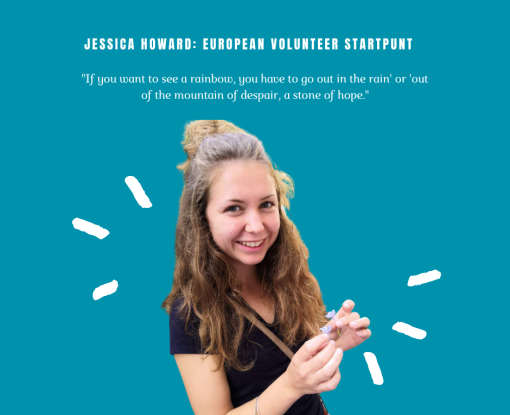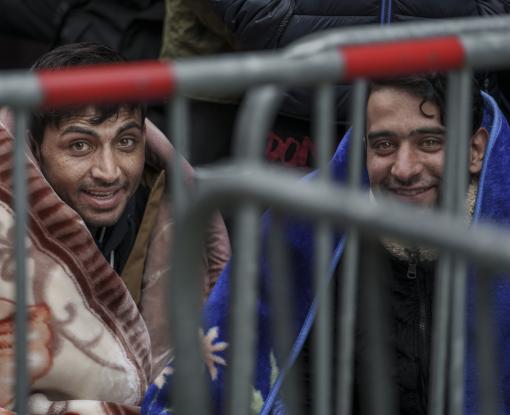Blog 2: I knew it was cold from looking out the window

This week things started to improve at the Klein Kasteeltje, many different organizations came together to provide humanitarian aid, and at the same time, the number of men being able to enter to request international protection increased. The fact that some men were given an Annexe 26 (the document which prove that the individual has made a claim for international protection) and accommodation is definitely great news, but it feels weird to be celebrating people being able to access a basic human right.
On Thursday morning, I was working from home, with a cup of tea in my hand, admiring the snow when an Afghan number popped up on my screen. When I answered the phone, the man on the other end explained that we had met last week when Vluchtelingenwerk went to the Klein Kasteeltje, at night to distribute blankets. I remembered this man because he asked me to take a photo, of him and his friend, which I then sent to him via WhatsApp. He was gleeful, telling me that he had finally ‘gotten in’ and that he already knew where his permanent reception centre would be.
"Thinking back, telling somebody well done for getting a reception centre is kind of crazy"
Not being from Belgium, I had no idea where the place he was talking actually was or whether it was nice town or village to live in. Nonetheless, my innate reaction was to congratulate him and tell him well done. Thinking back, telling somebody well done for getting a reception centre is kind of crazy. I understand why it might be the right thing to tell somebody who has just managed to escape a war torn country, or survived crossing inhumane landscapes but it doesn’t seem right to equate these experiences with managing to access a right which is protected by Belgian law.
However, in the moment it felt right. This man had survived over two weeks sleeping on the streets and still managed to smile and make jokes, something I personally fail to do unless provided with adequate sleep and caffeine.

After talking to this man, I went back to typing, drinking tea and gazing at the snow. As it got heavier, I remarked at how my normally mundane view was transforming into something beautiful, and took some pictures to send to my family at home in Ireland. The pictures taken at Klein Kasteelje, at the same time, told a very different story as men huddled together under pieces of plastic to shelter themselves from the elements.
Even if this plastic could protect them from the wetness of the snow, it could do nothing to save them from the cold air. Despite the weather conditions, no single men were given appointments to apply for asylum that day. For many this meant a night on the street with the sludge leftover from the mornings snow shower.

I knew it was cold from looking out the window, but, that evening when I had to walk 50 minutes to go sort something for my new house, I was shocked by how cold it actually was. I really wanted to walk to get some fresh air but half way through the journey, I could feel my fingers swelling from the cold, despite the fact that I was wearing gloves. As such, when I saw a bus pull in at a stop just in front of me, I immediately started to run to catch it. I hoped on, tapped my card and realized how easy it was for me to escape the cold.
Most of us have the option of buying a bus ticket or a hot drink, we also have friends and family who would happily invite us into their homes, but this isn’t the case for a lot of people seeking international protection. Being out in the snow made me appreciate just how resilient these men must be to sleep on the streets for several nights in row and still have the ability to be polite and smile. In my opinion, it is a testimony to these people that there has not been a big revolt at the Klein Kasteeltje.
The other thing that really struck me this week, was a conversation I had with a person from another EU member state. This person told me that they belonged to a minority group and had spent several years in a state institution where they had experienced abuse. They had ample evidence to support their claim and had already tried to bring a case against the State in their country of origin, but it was dismissed by the courts.
"Being out in the snow made me appreciate just how resilient these men must be to sleep on the streets for several nights"
Up until starting work with Vluchtelingenwerk, it had never crossed my mind to think about how European law affects citizen’s right to claim asylum. As an EU citizen, I have grown up listening to the advantages of free movement and the infamous Schengen agreement. EU citizens can go on holidays wherever they like in the union, they can also move and apply for work in any other member states, but, they can only stay for longer than three months if they have the means to support themselves.
Moreover, they cannot access welfare in another member state unless they are a resident there and have been working for a specified period of time. At the same time, it is almost impossible for an EU citizen to request asylum in another EU member state because all EU member states consider each other to be safe, democratic states with a good human rights record.
It doesn’t take too long to realize that this is not always the case. Every year there are countless claims of human rights violations made against member states at the European Courts of Human Rights. There are also several cases each year were this court decides that the treatment of individuals, who belong to minority groups, amounts to torture or inhumane conditions. If people are being tortured in the EU either directly or indirectly as a result of state policies without any way of accessing justice, surely, we can agree that there are people in the EU who are ’unable or unwilling to return to their country of origin owing to a well-founded fear of being persecuted for reasons of race, religion, nationality, membership of a particular social group, or political opinion.’
"I imagine that most people in this man’s situation feel like they have no choice but to reside illegally in Belgium"
Belgium concluded that this person’s asylum application was unfounded because they could apply for a residence permit but this does not really make sense to me. Yes, they have the right to stay and try find work in Belgium but what will happen to them if their disability prevents them from finding gainful employment? Will they have no option but to return to a country where they do not feel safe and are discriminated against because of their ethnicity and disability?
The only advice I could give the man was to contact different organizations who could give him aid but this is a short time solution. I imagine that most people in this man’s situation feel like they have no choice but to reside illegally in Belgium.
All in all, while there were a lot of frustrating and sad moments this week, I also had a lot of opportunities to learn more about the asylum procedure and some of the gaps in the asylum legislation here in Belgium. As always, I was extremely grateful to have so many people around me who were willing to spend time answering my questions and introducing me to new topics. It is always interesting learning from others especially from those colleagues who have lived experience of the asylum procedure and I hope to continue to learn from them and be inspired by them in the coming weeks.
IN COLLABORATION WITH


